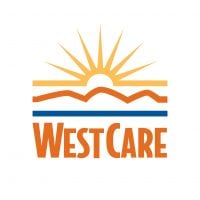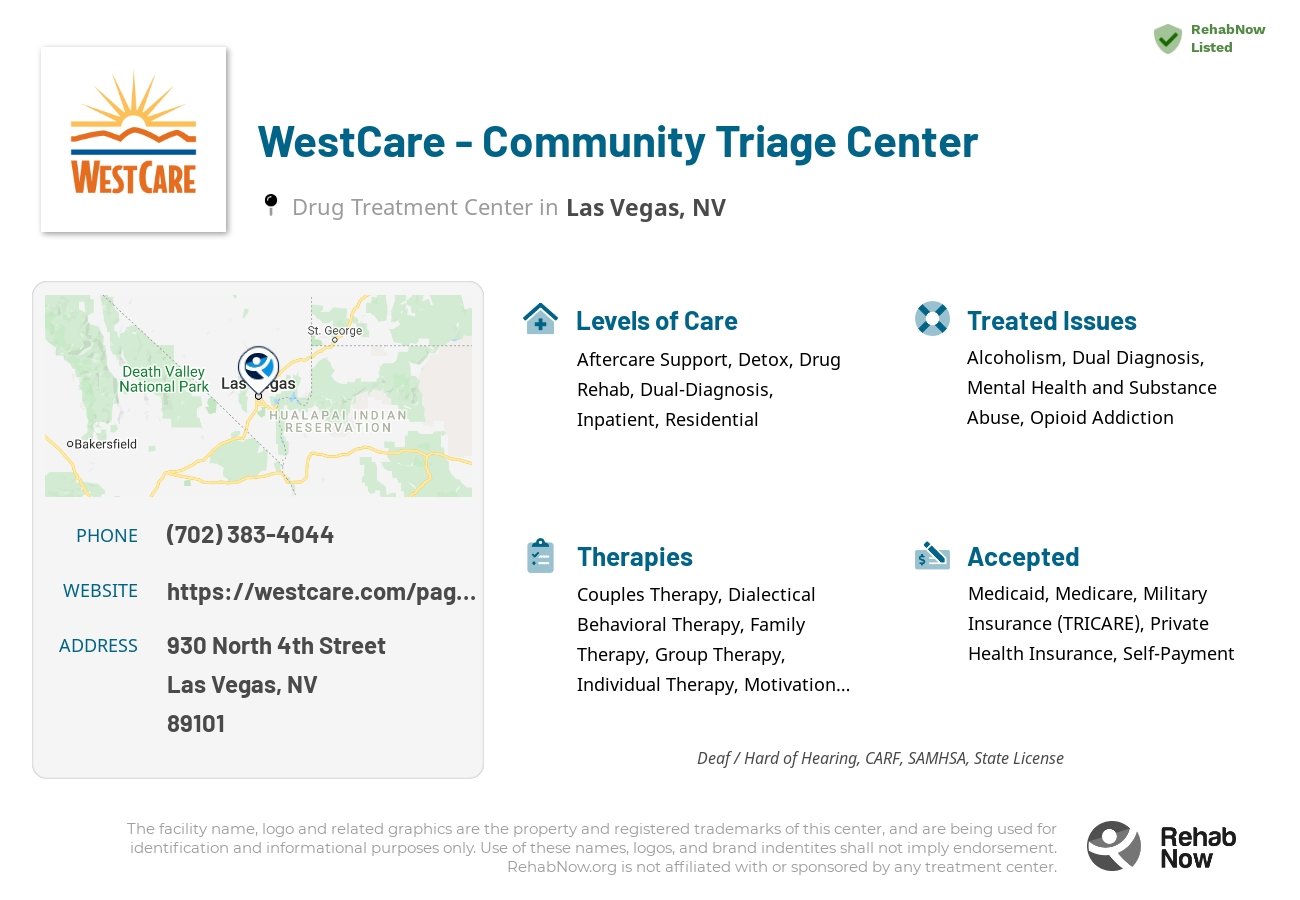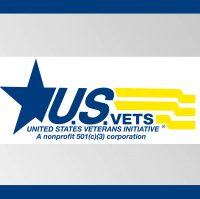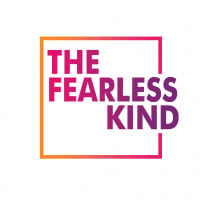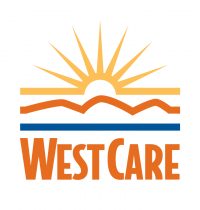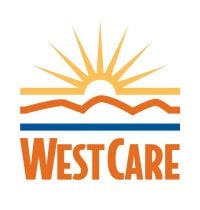WestCare - Community Triage Center
Drug Rehab Center in Las Vegas, Nevada
WestCare - Community Triage Center in Las Vegas, Nevada is an accredited and licensed addiction treatment facility providing comprehensive services for individuals struggling with substance abuse issues, including evidence-based therapies, specialized services for adolescents and co-occurring disorders, family therapy, and continuing care options.
About This Nevada Facility
WestCare - Community Triage Center in Las Vegas, Nevada is an accredited and licensed addiction treatment facility providing a variety of services for individuals struggling with substance abuse issues. Their staff consists of experienced professionals who focus on helping people improve their quality of life and develop healthier lifestyle choices. They provide a wide array of services from medical and therapeutic interventions to relapse prevention and recovery support.
WestCare - Community Triage Center is committed to providing the highest quality of care to those in need of addiction and substance abuse help. They offer individualized treatment plans designed to meet each person's specific needs, including evidence-based therapies such as cognitive behavioral therapy and mindfulness-based practices. They also have specialized services to help adolescents and co-occurring disorders, as well as family therapy and parenting classes. Additionally, they provide comprehensive discharge planning to ensure successful reentry into the community and continuing care options.
WestCare - Community Triage Center is nationally accredited by the Commission on Accreditation of Rehabilitation Facilities (CARF) and holds a license from the Nevada Division of Public and Behavioral Health. In addition, they have received numerous awards for their commitment to quality care, including the Nevada State Behavioral Health Services Quality Awards for Excellence. They make use of cutting-edge technologies such as telehealth to provide care for those unable to physically attend appointments, as well as case management services to help individuals transition from treatment to long-term recovery.
Genders
Ages
Modality
Additional
Accreditations
State License
SAMHSA

CARF
The Commission on Accreditation of Rehabilitation Facilities (CARF) is a non-profit organization that specifically accredits rehab organizations. Founded in 1966, CARF's, mission is to help service providers like rehab facilities maintain high standards of care.
Conditions and Issues Treated
Opioid addiction is the result of repeated use, or abuse, of opioid drugs. It is recommended for people who are dependent on opioids, or who have a high risk for dangerous health concerns, to seek professional treatment. Treatment plans usually include behavioral therapy and medication-assisted treatment.
Opioid drugs include: fentanyl, heroin, methadone, oxycodone, and oxymorphone.
Opioid addiction treatment is beneficial for:
- People who have a history of severe withdrawal.
- People with a high risk for dangerous health concerns.
- People having difficulty overcoming opioid addiction on their own.
There are different kinds of Dual Diagnosis:. A person who simultaneously experiences both a mental illness and an addiction disorder. Or, a person who experiences one or more coexisting (simultaneous) mental health conditions in addition to a primary substance use disorder.
The treatment requires a multi-disciplinary approach, it’s crucial for individuals to partner up with a healthcare provider who understands all the recovery components.
Levels of Care Offered at WestCare - Community Triage Center
This center offers a variety of custom treatment tailored to individual recovery. Currently available are Aftercare Support, Detox, Drug Rehab, Dual-Diagnosis, Inpatient, Residential, with additional therapies available as listed below.
Detox is the stage of recovery where the drugs or alcohol are entirely removed from your body. There are two different ways to detox, with medications and without. For many drugs and alcohol, the acute phase of detox can be completed in a number of days.
Inpatient treatment is the most intensive level of care, and it’s necessary for those who aren’t able to control their addiction. These patients also must be drug-free before attending inpatient programs .
During inpatient treatment, addicts live at an inpatient facility 24 hours a day while receiving help. This type of program is generally recommended for those who need to go through detoxification or who are struggling with serious addiction-related issues.
Residential treatment programs are those that offer housing and meals in addition to substance abuse treatment. Rehab facilities that offer residential treatment allow patients to focus solely on recovery, in an environment totally separate from their lives. Some rehab centers specialize in short-term residential treatment (a few days to a week or two), while others solely provide treatment on a long-term basis (several weeks to months). Some offer both, and tailor treatment to the patient’s individual requirements.
Aftercare support is a service many addicts need to ensure their success at recovery. This service usually includes one-on-one or group therapies, assistance from a sponsor and other types of help designed to make sure the patient continues living a life free from drugs.
Patients also may require medication to help them battle addiction. Some people have been able to successfully recover without additional medications, but others have found that they need help during their transition. Long-term, the patient must take the initiative to attend meetings and receive help from other addicts in recovery.
Therapies & Programs
People in addiction recovery can benefit from individual therapy. This type of therapy involves meeting with a therapist one-on-one. This allows for a personal and trusting relationship to be built so that the patient can be truly themselves and express any emotions they feel. Individual therapy leads to greater understanding and peace about your triggers for addiction and coping strategies to prevent relapse.
Couples therapy for drug addiction is based on the belief that addiction is a family disease. Everyone involved with an addict, not just the addict themselves, is affected by their behavior and the changes the addict goes through. The relationship also changes the addict’s significant other and has likely picked up some codependent behaviors. Codependency is a term used to describe a person obsessed with another person and their needs and feelings while neglecting their own. Addicts are usually people-pleasers, so it is understandable how one can become codependent in relationships with addicts.
Family therapy is a type of group problem-solving that aims to improve communication and relationships between the patient, their family, and sometimes friends. The main goal of family therapy for drug addiction is to create an environment where communication can occur without judgment, hostility, or blame. The therapist is with the family as they learn to communicate with each other differently, especially with the addict when s/he is using.
Group therapy sessions are held in rehab facilities, clinics, churches or community centers that offer drug addiction treatment. People who attend these groups are encouraged to voice their feelings and support other addicts in recovery. This helps group members strengthen their own recovery program while cheering on others who are struggling with sobriety.
Group therapy sessions provide recovering addicts with a chance to cope with everyday situations that many face. Group therapy sessions are held in rehab facilities, clinics, churches or community centers that offer drug addiction treatment.
People who attend these groups are encouraged to voice their feelings and support other addicts in recovery. This helps group members strengthen their own recovery program while cheering on others who are struggling with sobriety.
If you’re looking for addiction treatment, it’s important to find a facility that offers trauma therapy. This type of therapy helps people process and understand the past traumas that have led to their addiction. Trauma therapists will work with clients to help them understand their past and present relationships and show them that they are worthy of love. This therapy is typically done using visualization, discussion, and writing down thoughts and feelings.
Trauma Therapy is a form of therapy that involves working with a patient to help them process and understand the past trauma(s) in their life. This therapy is typically done using techniques such as visualization, discussion, and writing down thoughts and feelings. The main goals of trauma therapy is to help clients express their emotions and talk about what they are feeling.
Dialectical Behavior Therapy (DBT) is a form of cognitive-behavioral therapy that helps people understand how they connect their thoughts, behaviors, and feelings. It can give them more control over their actions, effectively stopping self-harm ideations and attempts in some patients. It also helps put those with borderline personality disorder into control for managing mental struggles.
A new study has shown that DBT works for those with self-harm behaviors and addictions by giving them therapy they can relate to and understand.
Cognitive Behavioral Therapy (CBT) helps addicts identify faulty, negative thinking so that they can work together with the therapist to find healthier ways of thinking. CBT focuses on specific aspects of each person’s thinking, feeling, physiology, and behavior. It aims to identify specific problems in these areas, and create a personalized treatment strategy.
Payment Options Accepted
For specific insurance or payment methods please contact us.
Is your insurance accepted?
Ask an expert, call (888) 674-0062
WestCare Community Involvement Center Associated Centers
Discover treatment facilities under the same provider.
- WestCare - Community Involvement Center Las Vegas in Las Vegas, NV
- WestCare - Community Involvement Center Pahrump in Pahrump, NV
- WestCare - Community Involvement Center – Tonopah in Tonopah, NV
- WestCare - Community Triage Center in Reno, NV
- WestCare - Henderson in Henderson, NV
Learn More About WestCare Community Involvement Center Centers
Additional Details
Specifics, location, and helpful extra information.
Las Vegas, Nevada 89101 Phone Number(702) 383-4044 Meta DetailsUpdated November 25, 2023
Staff Verified
Patient Reviews
There are no reviews yet. Be the first one to write one.
Las Vegas, Nevada Addiction Information
The state of Nevada has been plagued by drug and alcohol abuse for years. In 2015, Nevada ranked 4th in the nation for drug overdoses. More than 600 people died due to drug abuse that year and almost 70% of those overdoses were opioid-related. The state legalized medical marijuana in 2001 and recreational marijuana was also legalized in 2017.
Las Vegas, Nevada is a city that is known for its high rates of alcohol and drug addiction and abuse. About 22.5% of people in Las Vegas, NV abuse drugs. In 2017, there were 814 drug-related arrests in Las Vegas. If you are struggling with addiction, it is important to get help from a reputable treatment facility. Each treatment facility in Las Vegas offers its unique approach to recovery.
Treatment in Nearby Cities
- Fallon, NV (302.4 mi.)
- Dayton, NV (322.6 mi.)
- Carson City, NV (326.8 mi.)
- Lake Arrowhead, NV (177.1 mi.)
- Elko, NV (323.4 mi.)
Centers near WestCare - Community Triage Center
The facility name, logo and brand are the property and registered trademarks of WestCare - Community Triage Center, and are being used for identification and informational purposes only. Use of these names, logos and brands shall not imply endorsement. RehabNow.org is not affiliated with or sponsored by WestCare - Community Triage Center.
